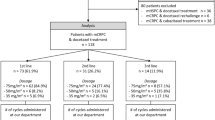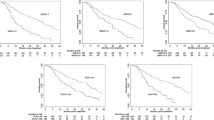Abstract
Background
Prostate cancer is a prevalent cancer in men worldwide, and castration-resistant prostate cancer (CRPC) is characterized by disease progression despite androgen deprivation therapy. While clinical and prognostic biomarkers have been identified in CRPC, the significance of serum inflammatory markers remains unclear.
Materials and methods
This retrospective study included 79 CRPC patients treated with abiraterone or enzalutamide. Inflammatory markers, including the modified Glasgow prognostic score (mGPS), systemic immune-inflammation index (SII), and neutrophil-to-lymphocyte ratio (NLR), were assessed as predictive tools for treatment response. Patient data were obtained from medical charts, and statistical analyses were performed.
Results
The median age of the patients was 67 years, with most having a Gleason score of 8–10. The median values for NLR, PLR, and SII were 2.9, 168.5, and 713.5, respectively. The objective response rate (ORR) to abiraterone or enzalutamide therapy was 55.1%. mGPS showed a significant association with ORR, with the mGPS 0 group having the highest response rate (59.5%). Median progression-free survival (PFS) was 12.8 months, and median overall survival (OS) was 35.4 months. Palliative radiotherapy during therapy and PSA doubling time were independent prognostic factors for PFS.
Conclusions
mGPS and PSA doubling time significantly impacted survival, and mGPS significantly predicted the treatment response in mCRPC, which may lead to further prospective studies.



Similar content being viewed by others
Data availability
The data supporting this study’s findings are not openly available. Further inquiries can be directed to the corresponding author.
References
Mottet N, van den Bergh RCN, Briers E, Van den Broeck T, Cumberbatch MG, De Santis M et al (2021) EAU-EANM-ESTRO-ESUR-SIOG guidelines on prostate cancer-2020 update. Part 1: screening, diagnosis, and local treatment with curative intent. Eur Urol 79(2):243–262
Heller G, McCormack R, Kheoh T, Molina A, Smith MR, Dreicer R et al (2018) Circulating tumor cell number as a response measure of prolonged survival for metastatic castration-resistant prostate cancer: a comparison with prostate-specific antigen across five randomized phase III clinical trials. J Clin Oncol 36(6):572–580
Armstrong AJ, Lin P, Higano CS, Sternberg CN, Sonpavde G, Tombal B et al (2018) Development and validation of a prognostic model for overall survival in chemotherapy-naïve men with metastatic castration-resistant prostate cancer. Ann Oncol 29(11):2200–2207
Lara PN Jr, Ely B, Quinn DI, Mack PC, Tangen C, Gertz E et al (2014) Serum biomarkers of bone metabolism in castration-resistant prostate cancer patients with skeletal metastases: results from SWOG 0421. J Natl Cancer Inst 106(4):dju013
Halabi S, Kelly WK, Ma H, Zhou H, Solomon NC, Fizazi K et al (2016) Meta-analysis evaluating the impact of site of metastasis on overall survival in men with castration-resistant prostate cancer. J Clin Oncol 34(14):1652–1659
Moreira DM, Howard LE, Sourbeer KN, Amarasekara HS, Chow LC, Cockrell DC et al (2016) Predictors of time to metastasis in castration-resistant prostate cancer. Urology 96:171–176
Ando K, Sakamoto S, Saito S, Maimaiti M, Imamura Y, Sazuka T et al (2021) Prognostic value of high-sensitivity modified Glasgow prognostic score in castration-resistant prostate cancer patients who received docetaxel. Cancers (Basel) 13(4):773
Neuberger M, Goly N, Skladny J, Milczynski V, Weiß C, Wessels F et al (2022) Systemic inflammatory biomarkers as predictive and prognostic factors in men with metastatic castration-refractory prostate cancer treated with docetaxel therapy: a comprehensive analysis in a German real-world cohort. J Cancer Res Clin Oncol 149(7):3371–3381
Neuberger M, Skladny J, Goly N, Wessels F, Weiß C, Egen L et al (2022) Baseline modified Glasgow prognostic score [mGPS] predicts radiologic response and overall survival in metastatic hormone-sensitive prostate cancer treated with docetaxel chemotherapy. Anticancer Res 42(4):1911–1918
Yazgan SC, Yekedüz E, Utkan G, Ürün Y (2022) Prognostic role of pan-immune-inflammation value in patients with metastatic castration-resistant prostate cancer treated with androgen receptor-signaling inhibitors. Prostate 82(15):1456–1461
Therasse P, Arbuck SG, Eisenhauer EA, Wanders J, Kaplan RS, Rubinstein L et al (2000) New guidelines to evaluate the response to treatment in solid tumors. European Organization for Research and Treatment of Cancer, National Cancer Institute of the United States, National Cancer Institute of Canada. J Natl Cancer Inst 92:205–216
Arlen PM, Bianco F, Dahut WL, D’Amico A, Figg WD, Freedland SJ et al (2008) Prostate specific antigen working group guidelines on prostate-specific antigen doubling time. J Urol 179:2181–2185
Proctor MJ, McMillan DC, Morrison DS, Fletcher CD, Horgan PG, Clarke SJ (2012) A derived neutrophil to lymphocyte ratio predicts survival in patients with cancer. Br J Cancer 107(4):695–699
Kawahara T, Kato M, Tabata K, Kojima I, Yamada H, Kamihira O et al (2020) A high neutrophil-to-lymphocyte ratio is a poor prognostic factor for castration-resistant prostate cancer patients who undergo abiraterone acetate or enzalutamide treatment. BMC Cancer 20(1):919
McMillan DC (2009) Systemic inflammation, nutritional status and survival in patients with cancer. Curr Opin Clin Nutr Metab Care 12(3):223–226
Gil M, Gomes A, Baptista M, Vale Martins R, Nunes V (2022) Inflammatory and nutritional biomarkers as predictors of non-resectability and early recurrence in pancreatic and periampullary cancer. Minerva Surg 77(2):130–138
Freitas C, Jacob M, Tavares N, Cruz-Martins N, Souto-Moura C, Araújo D et al (2021) Modified Glasgow prognostic score predicts survival among advanced non-small cell lung carcinoma patients treated with anti-PD1 agents. Anticancer Drugs 32(5):567–574
Shafique K, Proctor MJ, McMillan DC, Qureshi K, Leung H, Morrison DS (2012) Systemic inflammation and survival of patients with prostate cancer: evidence from the Glasgow inflammation outcome study. Prostate Cancer Prostatic Dis 15:195–201
Shafique K, Proctor MJ, McMillan DC, Leung H, Smith K, Sloan B, Morrison DS (2013) The modified Glasgow prognostic score in prostate cancer: results from a retrospective clinical series of 744 patients. BMC Cancer 13:292
Linton A, Pond G, Clarke S, Vardy J, Galsky M, Sonpavde G (2013) Glasgow prognostic score as a prognostic factor in metastatic castration-resistant prostate cancer treated with docetaxel-based chemotherapy. Clin Genitourin Cancer 11:423–430
Stangl-Kremser J, Mari A, Suarez-Ibarrola R, D’Andrea D, Korn SM, Pones M et al (2020) Development of a prognostic model for survival time prediction in castration-resistant prostate cancer patients. Urol Oncol 38:600.e9-600.e15
Zhou Y, Lin C, Hu Z, Yang C, Zhang R, Ding Y et al (2021) Differences in survival of prostate cancer Gleason 8–10 disease and the establishment of a new Gleason survival grading system. Cancer Med 10(1):87–97
Gordetsky J, Epstein J (2016) Grading of prostatic adenocarcinoma: current state and prognostic implications. Diagn Pathol 11:25
Chen WJ, Kong DM, Li L (2021) Prognostic value of ECOG performance status and Gleason score in the survival of castration-resistant prostate cancer: a systematic review. Asian J Androl 23(2):163–169
Nishimoto M, Fujita K, Yamamoto Y, Hashimoto M, Adomi S, Banno E et al (2022) Prognostic factors in Japanese men with high-Gleason metastatic castration-resistant prostate cancer. Transl Cancer Res 11(8):2681–2687
Howard LE, Moreira DM, De Hoedt A, Aronson WJ, Kane CJ, Amling CL et al (2017) Thresholds for PSA doubling time in men with non-metastatic castration-resistant prostate cancer. BJU Int 120(5B):E80–E86
Matsubara N, Chi KN, Özgüroğlu M, Rodriguez-Antolin A, Feyerabend S, Fein L, Alekseev BY et al (2020) Correlation of prostate-specific antigen kinetics with overall survival and radiological progression-free survival in metastatic castration-sensitive prostate cancer treated with abiraterone acetate plus prednisone or placebos added to androgen deprivation therapy: post hoc analysis of phase 3 LATITUDE study. Eur Urol 77(4):494–500
Markowski MC, Chen Y, Feng Z, Cullen J, Trock BJ, Suzman D et al (2019) PSA doubling time and absolute PSA predict metastasis-free survival in men with biochemically recurrent prostate cancer after radical prostatectomy. Clin Genitourin Cancer 17(6):470-475.e1
Klaassen Z, Howard L, Wallis CJD, Janes JL, De Hoedt A, Aronson WJ et al (2022) Is time to castration resistant prostate cancer a potential intermediate end-point for time to metastasis among men initiating androgen deprivation therapy for non-metastatic prostate cancer with rapid PSA doubling time[< 9 months]? Prostate Cancer Prostatic Dis 26(1):151–155
Cui PF, Cong XF, Gao F, Yin JX, Niu ZR, Zhao SC, Liu ZL (2020) Prognostic factors for overall survival in prostate cancer patients with different site-specific visceral metastases: a study of 1358 patients. World J Clin Cases 8(1):54–67
Satapathy S, Mittal BR, Sood A (2020) Visceral metastases as predictors of response and survival outcomes in patients of castration-resistant prostate cancer treated with 177Lu-labeled prostate-specific membrane antigen radioligand therapy: a systematic review and meta-analysis. Clin Nucl Med 45(12):935–942
Shameem R, Hamid MS, Xu KY, Wu S (2015) Comparative analysis of the effectiveness of abiraterone before and after docetaxel in patients with metastatic castration-resistant prostate cancer. World J Clin Oncol 6(4):64–72
Cheng HH, Gulati R, Azad A, Nadal R, Twardowski P, Vaishampayan UN et al (2015) Activity of enzalutamide in men with metastatic castration-resistant prostate cancer is affected by prior treatment with abiraterone and/or docetaxel. Prostate Cancer Prostatic Dis 18(2):122–127
Funding
There have been no financial or other relationships. There was no funding.
Author information
Authors and Affiliations
Contributions
All authors read and gave their stamp of approval for the submission of the final version of the manuscript.
Corresponding author
Ethics declarations
Conflict of interest
The authors declare that there are no conflicts of interest.
Ethical approval
The Local Ethics Committee of Istanbul Medipol University approved the study in October of 2022 (E-10840098-772.02-6509). Further inquiries can be directed to the corresponding author.
Informed consent
Written informed consent was obtained from all participants.
Additional information
Publisher's Note
Springer Nature remains neutral with regard to jurisdictional claims in published maps and institutional affiliations.
Rights and permissions
Springer Nature or its licensor (e.g. a society or other partner) holds exclusive rights to this article under a publishing agreement with the author(s) or other rightsholder(s); author self-archiving of the accepted manuscript version of this article is solely governed by the terms of such publishing agreement and applicable law.
About this article
Cite this article
Goktas Aydin, S., Kutlu, Y., Muglu, H. et al. Predictive significance of inflammatory markers and mGPS in metastatic castration-resistant prostate cancer treated with abiraterone or enzalutamide. Cancer Chemother Pharmacol 93, 71–78 (2024). https://doi.org/10.1007/s00280-023-04592-x
Received:
Accepted:
Published:
Issue Date:
DOI: https://doi.org/10.1007/s00280-023-04592-x




